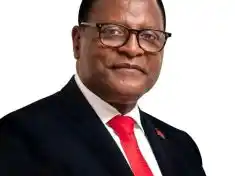
President Lazarus Chakwera’s failure to confront the nation’s deepening security crisis in his latest national address isn’t just a missed opportunity it’s a glaring leadership failure that could define his legacy.
Malawi today stands at a crossroads, shaken by political violence, public fear, and growing distrust in state institutions. When a president speaks to the nation during such times, citizens expect more than scripted platitudes. They expect courage. They expect accountability. They expect leadership.
Yet Chakwera, for the third time in as many months, opted to play it safe. He danced around the elephant in the room the brutal attacks on peaceful demonstrators, carried out in broad daylight and full view of state security forces. The silence on this matter was not just disappointing; it was dangerous.
This was not merely a case of a leader “missing a penalty.” It was the equivalent of refusing to take the shot while the nation watched from the sidelines bruised and bewildered.
Chakwera had a golden chance to demonstrate that he stands with the people to reassure Malawians that their voices matter and that justice is not reserved for the powerful. Instead, by refusing to dismiss or even reprimand the Inspector General of Police and the Commander of the Malawi Defence Force, both of whom oversaw forces that watched idly as violence unfolded, the president chose appeasement over accountability.
The question Malawians are now asking is simple: If the president cannot act when citizens are being assaulted for exercising their constitutional rights, when will he act?
We are not in ordinary times. Democracy is under stress. The rule of law is fraying. And the longer Chakwera avoids action, the more emboldened political thugs become and the more betrayed citizens feel.
Yes, Chakwera’s speech coincided with the opening of the 2025 campaign period. But instead of offering hope or reaffirming democratic ideals, he delivered ambiguity and silence precisely when clarity and conviction were most needed.
Malawians do not want a president who avoids controversy. They want one who confronts it. They want a leader who can make hard decisions, not one who evades them.
Leadership isn’t about comfort. It’s about responsibility. And if President Chakwera continues to dodge the nation’s most urgent concerns, history may not remember him as a unifier or reformer but as a leader who watched from the podium while his nation cried for justice.
The time for caution has passed. What Malawi needs now is boldness. The question is: Will Chakwera rise to the moment or continue missing the goal while the country slips further into uncertainty?



0 Comments